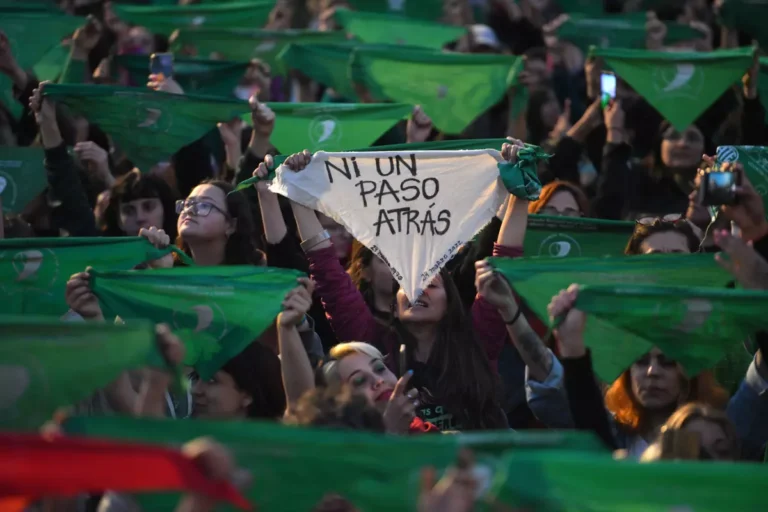
By LUCI CAVALLERO (Ni Una Menos, Argentina)
As a contribution to the discussion and feminist and migrant struggles against racist and patriarchal violence, that will be the focus of the transnational meeting in Madrid coorganized by Teritorio Doméstico, EAST and TMC, we publish an article on the reasons and challenges of the feminist strike in Argentina. On January 24th there will be a general strike in Argentina against the policies of the newly elected president Javier Milei. In this article, that we are translating from Castilian, Ni Una Menos activist Luci Cavallero explains why it is necessary for the 24th of January strike to be a feminist strike. Elected on November 23rd, anarcho-capitalist Milei started a shock therapy promised to Argentina during the electoral campaign. Through the Necessity and Urgency Decree (DNU) he has sketched out over 300 measures to start the process of privatizations and further neoliberalization with the aim to save the country from economic and inflation ongoing crisis. At the end of December, his government presented to the Parliament a bill in which he asks the Congress to transfer its legislative power to the Executive invoking the «public emergency» until December 25th 2025 (with the possibility of a two-year extension. Replicating what was done before the 1976 coup, Milei claims to get rid not only of the social and political conquests gained in the last decades, but also of the institutional and political tools used to obtain them. The DNU drastically limits the right to strike, defining as «essential services» not only education and care work, but also most services and productive activities and obliging to guarantee performance levels no lower than 75% of normal functioning during the strikes. The DNU also allows for the dismissal of strikers if the employer finds that they have threatened the right to work of other employees. Finally, the “anti-picketing protocol” punishes protesters who block roads and effectively authorizes indiscriminate use of violence by the police against those who demonstrate. Protests against the DNU began from the moment it was announced, and now the CGT has called a general strike for January 24th. Luci insists on the importance of giving a feminist sign to this strike because Milei’s measures are patriarchal measures that reveal his war on women, protagonists of the most important struggles in recent years, and on the poor. In fact, these measures hit hard on the care work done by women, reduce the days of leave during pregnancy, threaten the abortion law and the Ley Micaela, which imposes mandatory training on gender and sexual violence for those working in the state sectors. While the war that spreads on more and more fronts, entering local politics, seems to close any possibility of struggle, the feminist strike crosses national borders, paving the way for a transnational March 8th that is up to the present: the challenge, as Luci points out, is to accumulate a force capable of connecting different positions, of breaking the fragmentation between subjects, identities, and labor categories, to overthrow the neoliberal authoritarianism which is making its way in every corner of the world.
January 24th is looming on the horizon as one of the most important dates with the goal to halt La Libertad Avanza’s project of turning us into a colony. Beside the development of regional plenary assemblies initiated by CGT, all over the country multiple calls are launched that aim to organize the strike on January 24th. The objective is to succeed in making the strike as massive as possible and stop the DNU, the bill ‘Ley Omnibus’ and the anti-protest protocol.
It is important to highlight that ‘multisectoriality’ is an objective to pursue in the current conjuncture. We know the difficulties of going on strike for many people in a world of labour which is very heterogenous and marked by a high level of informality.
Yet we also know that ‘multisectoriality’ means to be part of this call to strike and mobilize many collectives and people organized in different spaces of politicization that exceed union affiliation. I am referring for instance to tenants, artists, those who organize as militants of feminist and transfeminist collectives.
As feminists we do not lack reasons to call for a strike on January 24th: not only for sectorial claims against the DNU and the Ley Omnibus – that imply very concrete effects –, on rights conquered not long ago like the voluntary interruption of pregnancy (Law on Abortion), the One thousand days Law, or the Micaela Law; but also because we are affected by all those reforms that involve the right to housing, the access to the land, labour rights, food, health and public education.
We have already mobilized and we are present in the assemblies all over the country, in the cacerolazos, in the unions, in artists’ demonstrations, in the ingenious neighbours’ protests.
As feminist movement, to the extent that we are part of a popular field and a collective network, we have the duty to openly call to strike and mobilize on January 24th. We have the task to make this strike also a feminist strike.
The tools of the strike are not alien to us: it was one of the methods with which we resisted Macrism, we could make a qualitative leap as a movement in order to putting on the public stage the economic violence of wage gaps, of the non-recognition of care and community work, of the violence of external and domestic debt in our daily life.
It was also an instrument that allowed us in these years to organize beyond the divisions between those women who have a recognized and formal employment, those who work in popular economies, those who work in private homes, free-lancers, subcontracted workers, etc.
For this very reason, it does not seem by chance that, among other atrocities, the unconstitutional DNU declares various jobs including care and education – such as the children daycare and education in pre-schooling, primary and secondary levels – as essential activity. This implies the obligation to perform “minimum service” in going on strike.
The operation is clear: declaring these tasks as essential labour is a way to prevent the right to strike and, at the same time, hits those works that feminisms have denounced as constantly devalued in their recognition and remuneration.
We don’t think it is a coincidence either that they are trying to systematically present women who retired with pension moratorium as a ‘caste’ compared to other retirees. Today the government discriminates those who reach the pension through this moratorium by excluding them from benefits like bonuses. It is exactly the opposite of what we proposed a few years ago in the organization of the strikes and other feminist actions as those transversally called under the banner of the fighter Norma Plá.
The goal has always been to work inside and against the divisions of the working class in order to generate solidarity with the last ones, with the most disadvantaged by the racist and patriarchal system. We have been insisting and defending pension moratoria as a deeply feminist policy that has granted welfare rights to many women who have worked for all their life in their houses or under the command of bosses that did not pay their contributions. It has been an old age reparation for an invisibilized work. A proper pension.
They want to divide us, they want to take away our rights so that this country becomes a paradise for corporations and they are doing it with authoritarian and anti-constitutional methods. In the face of this danger, as feminists we call to go on strike and mobilize on the 24th. We think it is strategic to contribute to the construction of a multisectorial, massive, popular and feminist strike.





